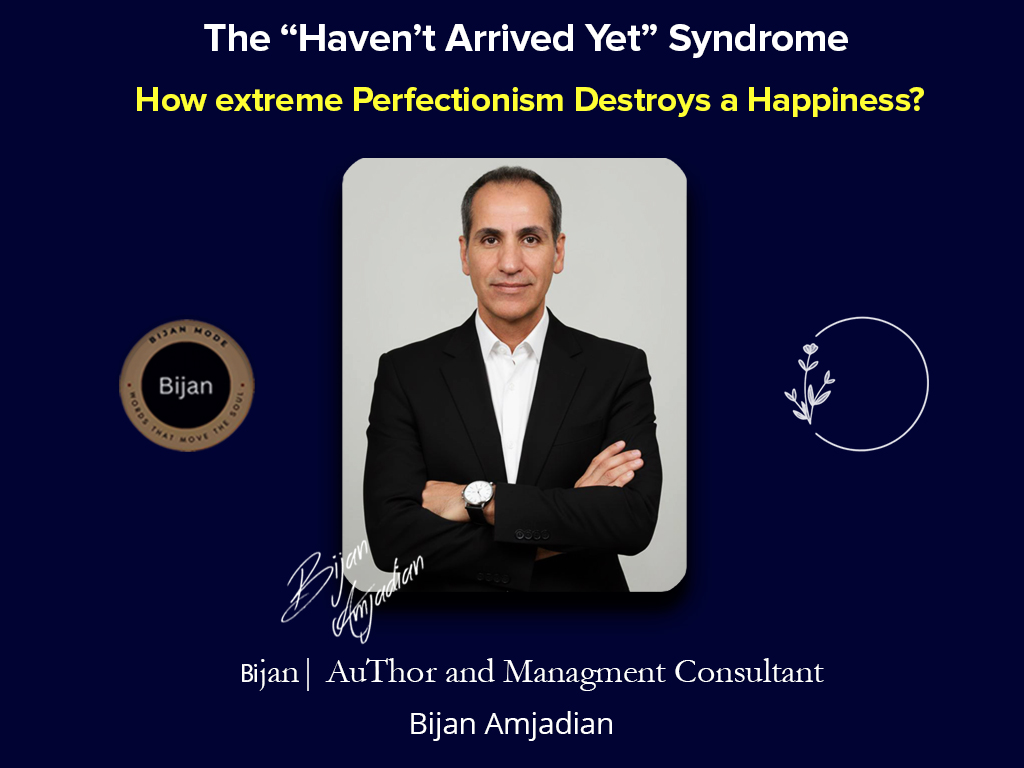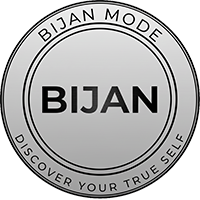
The "Haven't Arrived Yet" Syndrome
The "Haven't Arrived Yet" Syndrome: Dismissing Current Achievements and the Trap of Extreme, Limitless Perfectionism
Author: Bijan Amjadian
Date and place of Publication: November 18, 2025 the Netherlands
Do you constantly ignore your
accomplishments? Learn how to break the trap of extreme perfectionism through philosophical analysis and stress management. This article by Bijan Amjadian (Bijan) offers a
roadmap to lasting satisfaction.
In the age of speed, perfectionism is not only seen as a positive trait but is often a hidden trap. Many of us, even after achieving significant success—whether in business management or in personal and family life—suddenly realize that a deep sense of contentment and happiness remains elusive. We are constantly striving for a better position than the one we currently hold. This is where we encounter a phenomenon that can be termed The "Haven't Arrived Yet" Syndrome.
This syndrome is rooted in a common cognitive error: our minds constantly analyze and evaluate the value of past and present achievements, often dismissing them as insignificant or even worthless, focusing solely on distant horizons. From a psychological perspective, this dynamic can lead to chronic anxiety, burnout, and ultimately, the neglect of current assets. But the main question is: Where do the roots of this extreme perfectionism lie? Is it merely an innate, personal characteristic, or do social and economic structures also play a role in fueling it?
In this article, I delve into a deep analysis of this syndrome, drawing upon the concepts of Self-Knowledge and the Psychology of Perfectionism. You will see how this pattern can become a destructive and threatening barrier in sensitive life situations. Finally, I will provide practical and philosophical solutions to break this endless cycle.
1. The Psychological Roots of the Feeling of "Insufficiency"
The persistent feeling of "insufficiency" or "not having arrived yet," despite objective accomplishments, is rooted in the deep layers of our psychic structure and cognitive schemas. This syndrome is more than a functional defect; it is an acquired (learned) thought pattern, not an inherent (genetic) one, that is fueled and directed by childhood experiences and environmental pressures. This is influenced by the viewpoint of Sigmund Freud, who believed that "events and occurrences in childhood... impact adulthood."
1.1. From the "Ideal Self" to the "Real Self": The Intermediary Gap
Many psychotherapy analysts believe this syndrome is the result of the widening gap between the "Ideal Self" (what we think we should be) and the "Real Self" (what we currently are). Sustaining this ideal self over the long term, and only living through its imagination, leads to the formation of a "False Self".
• Unhealthy Perfectionism: This type suffers from an inability to enjoy and accept their own achievements. This creates a vicious cycle that blocks the path to inner contentment.
• Expert Note: Carl Rogers considered this incongruence to be the main source of anxiety. He argued the innate drive towards Self-Actualization is primarily aimed at Self-Fulfillment—becoming a "Fully Functioning Person."
1.2. Cognitive Schemas and Parental Influences
Cognitive psychology teaches that Schemas play a decisive role. These blueprints, formed in early childhood, are "thought templates" through which we interpret the world and ourselves.
• Defectiveness/Shame Schema: Individuals internalize a schema that essentially says, "I am flawed and unworthy of acceptance." Consequently, no great achievement can fundamentally alter this deep-seated belief.
• Externalization of Value: When an individual is only praised for high accomplishments, the message internalized is that "my worth is conditional."
2. The Trap of Extreme Perfectionism: An Existential Analysis of Emptiness in Success
When the feeling of "I haven't arrived yet" turns into a permanent pattern, we face an existential anxiety rooted in the philosophy and structure of modern society.
2.1. From Voluntarism to Existential Anxiety
• Existentialist Philosophy: Humans resort to building idols of success to fill the voidencountered in the face of freedom and the meaninglessness of the world.
• Emptiness in Success: The perfectionist mistakenly believes that the "next success" can be the answer to this existential void. When success is achieved, and the expected meaning is not found, the feeling of emptiness deepens. This is the trap people fall into during major life changes.
2.2. The Sociology of Comparison and the Attention Economy
Modern society is the main breeding ground for this syndrome, emphasizing:
• The "Acceleration Culture": An economic system that defines an individual's worth by Productivity inevitably leads to constant comparison. In this system, peace and contentmentare considered a form of "failure."
• Social Networks and the Attention Economy: Virtual platforms create an unrealistic standard of living, causing individuals to dismiss their own achievements and constantly feel they are lagging behind "virtual competitors." The result is the perception of "treading water in a swamp."
3. Analysis Paralysis and Stress
Management: How "I Haven't Arrived Yet" Destroys Career Performance
The syndrome of extreme perfectionism in the field of management manifests itself as Analysis Paralysis.
3.1. Analysis Paralysis: When Overthinking Becomes Counter-Productive
• Risk Management: This pattern is the greatest enemy of Innovation and Agility. The perfectionist tries to eliminate risk entirely instead of managing it. This leads to procrastination, delayed decision-making, and the loss of critical opportunities.
• Decision-Making: This syndrome severely lowers the speed and quality of decision-making, trapping the individual in minor details.
3.2. Stress Management and Burnout in the Path of Mental Failure
• Economics of Time and Energy: Perfectionists spend their resources on improving the final 20% of a task's quality (from 80% good to 100% perfect). This sub-optimal allocation contradicts the principles of Microeconomics and Productivity.
• Burnout: The constant pressure to "be better than I am" creates a high level of unmanaged stress that rapidly leads to occupational burnout.
4. Breaking the Cycle: Practical Solutions and Self-Knowledge for Lasting Contentment
The key is to move beyond extreme perfectionism and find contentment in our actual achievements.
4.1. Redefining "Enough": Detaching from External Valuation
• Reverse Goal Setting: Focuses on real, proven achievements and competencies, freeing the mind from hypothetical shortcomings.
• Conscious Imperfection: Based on the principles of Practical Logic, consciously set the desired limit (e.g., 90%) and stop at that point. This aids your Time Management.
4.2. Practicing Mindfulness in Success and Rational Evaluation
• Mindful Celebration: Actively dedicate time to "celebrate small successes."
• The Socratic Three-Question Rule: Use philosophy and logic to challenge the thought "I haven't arrived yet": Reason? Consequence? and Alternative?
4.3. Recreating the "Ideal Self" Based on Core Values
• Focus on Core Values: Shift the metric of success from "How much wealth have I accumulated?" to "How much have I acted in alignment with my values?" This change is the key to lasting contentment and deep self-knowledge.
• Comparison with "Yesterday's Self": The only constructive comparison is today's performance versus yesterday's performance.
Conclusion: The "Haven't Arrived Yet" Syndrome: From the Trap of Perfectionism to Freedom of Action
The "Haven't Arrived Yet" Syndrome is not a personality flaw, but a deep-seated thought patternarising from the combination of social pressures, psychological schemas, and existential anxiety. The key to freedom lies in the conscious acceptance of imperfections and the redefinition of success based on core values and self-knowledge. Live in the present moment with logic and mindfulness regarding your current assets.
If you are looking for practical strategies to structure your life and manage the stress arising from competition and change, explore Bijan's specialized books in the fields of Self-Knowledge, Psychology, and Management.
References:
Psychological Thinkers and Theories:
1. Rogers, Carl: Theory of Self-Acceptance and Client-Centered Therapy.
2. Freud, Sigmund: Theories related to Schemas and Psychic Structure.
3. Adler, Alfred: Concept of the Inferiority Complex and the Striving for Superiority.
4. Young, Jeffrey E.: Principles of Schema Therapy and Defectiveness/Shame Schemas.
Philosophical and Existential Thinkers and Concepts:
5. Camus, Albert: Concept of Absurdism and Existential Anxiety.
6. Sartre, Jean-Paul: Concept of Responsible Freedom and Escape from Responsibility.
7. Aristotle: Concept of Eudaimonia (Human Flourishing).
Management, Productivity, and Cognitive Concepts:
8. Pareto Principle: Or the 80/20 Rule.
9. Kahneman & Tversky: Theory of Cognitive Bias and Prospect Theory.
